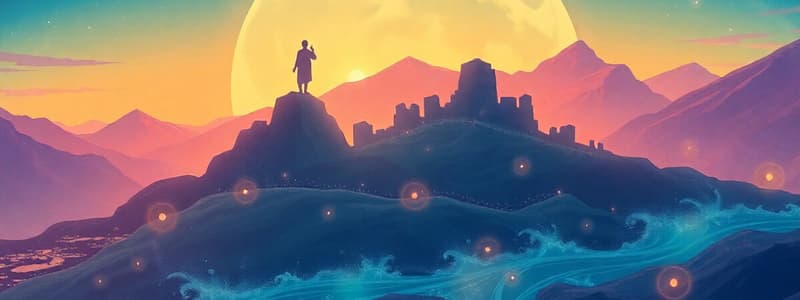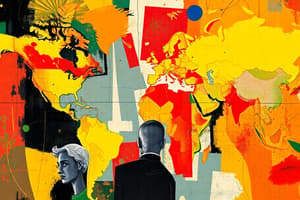Podcast
Questions and Answers
What is a primary focus of postcolonial literature?
What is a primary focus of postcolonial literature?
- Telling fictional fairy tales
- Analyzing gender identity
- Examining the legacy of colonialism (correct)
- Exploring climate change effects
Which movement primarily addresses the experiences of marginalized groups related to gender and sexuality?
Which movement primarily addresses the experiences of marginalized groups related to gender and sexuality?
- Postcolonial literature
- Feminist and queer literature (correct)
- Trauma literature
- Environmental literature
What challenge does the rise of digital publishing present to traditional publishing houses?
What challenge does the rise of digital publishing present to traditional publishing houses?
- Decrease in book sales
- Increased size of printed books
- Addressing the digital divide for accessibility (correct)
- Difficulty in reaching marginalized voices
What does trauma literature primarily focus on?
What does trauma literature primarily focus on?
Which aspect is crucial in discussions about cultural appropriation?
Which aspect is crucial in discussions about cultural appropriation?
Which theme emphasizes the impact of global interactions on individuals and cultures?
Which theme emphasizes the impact of global interactions on individuals and cultures?
What literary genre involves blending elements from different traditional categories?
What literary genre involves blending elements from different traditional categories?
Which theme features the exploration of issues like race, gender, and class?
Which theme features the exploration of issues like race, gender, and class?
What is a key characteristic of digital literature?
What is a key characteristic of digital literature?
What approach involves the use of personal narratives to discuss broader cultural issues?
What approach involves the use of personal narratives to discuss broader cultural issues?
Which of the following is NOT a prominent theme in 21st-century literature?
Which of the following is NOT a prominent theme in 21st-century literature?
What is an example of a growing genre that uses visual storytelling?
What is an example of a growing genre that uses visual storytelling?
Which literary characteristic continues to evolve within postmodern works?
Which literary characteristic continues to evolve within postmodern works?
Flashcards
21st-Century Literature
21st-Century Literature
Literature written after the year 2000, reflecting the rapid changes in technology, globalization, and social issues of this period.
Globalization and Interconnectedness
Globalization and Interconnectedness
The theme that explores how the world is becoming more interconnected due to globalization, leading to increased interaction between individuals, cultures, and societies.
Technology and Its Effects
Technology and Its Effects
The theme that examines the impact of technology on human experience, often exploring dystopian futures, the influence on communication, and the blurring of the real and virtual worlds.
Social Justice and Identity
Social Justice and Identity
Signup and view all the flashcards
Postmodernism
Postmodernism
Signup and view all the flashcards
Autofiction
Autofiction
Signup and view all the flashcards
Hybrid Genres
Hybrid Genres
Signup and view all the flashcards
Digital Literature
Digital Literature
Signup and view all the flashcards
Postcolonial Literature
Postcolonial Literature
Signup and view all the flashcards
Feminist and Queer Literature
Feminist and Queer Literature
Signup and view all the flashcards
Environmental Literature
Environmental Literature
Signup and view all the flashcards
Trauma Literature
Trauma Literature
Signup and view all the flashcards
Cultural Appropriation and Representation
Cultural Appropriation and Representation
Signup and view all the flashcards
Study Notes
Defining 21st-Century Literature
- 21st-century literature encompasses the diverse literary works produced since the turn of the millennium.
- It reflects the rapid shifts in technology, globalization, and social issues of this period.
- It explores themes like identity, social justice, and the impact of technology on human experience.
- Authors often experiment with form and technique, incorporating diverse voices and perspectives.
Key Themes and Trends
- Globalization and interconnectedness: This theme highlights the increasing interconnectedness of the world. Authors explore the impact of global interactions on individuals, cultures, and societies. This includes themes of immigration, cultural exchange, and the search for identity in a globalized world.
- Technology and its effects: The pervasiveness of technology is a central theme, examined through various lenses. This often includes dystopian futures, the impact on communication, and the blurring of the real and virtual worlds.
- Social justice and identity: Issues of race, gender, sexuality, and class are prominently featured. Authors often challenge existing power structures and explore marginalization and oppression. Literature often focuses on the lived experiences of diverse communities, increasing representation of minority groups.
- Postmodernism and experimental forms: Elements of postmodernism, such as fragmentation, irony, and metafiction, persist, though with new twists and turns. Authors are experimenting with form, incorporating diverse genres and perspectives.
Key Genres and Approaches
- Hybrid genres: Contemporary literature often defies simplistic categorization, blending genres like science fiction, fantasy, and realism in innovative ways.
- Autofiction and experimental narratives: Autofiction, a genre in which personal narratives are used to explore larger cultural issues, is gaining prominence. There's also a rise in experimental narratives that are more fragmented and less reliant on traditional plot structures.
- Digital literature and the internet: The emergence of digital platforms has facilitated new forms of literary expression. Online novels, interactive stories, and other digital texts are becoming increasingly significant.
- Graphic novels and comics: The popularity of graphic novels and comics continues to grow, offering a unique visual storytelling experience. New interpretations of traditional narratives and new stories are expressed via this medium.
Notable Movements and Trends
- Postcolonial literature: This movement explores the lasting legacy of colonialism across the globe. It often includes a perspective that looks both backward at the colonial period and forward to the complexities of globalization.
- Feminist and queer literature: These movements continue to challenge patriarchal structures, explore gender identity and sexuality, and provide insights into the experiences of marginalized groups.
- Environmental literature: The growing awareness of ecological concerns is reflected in this literature. Works examine human impact on the environment and suggest pathways towards sustainability.
- Trauma literature: This form focuses on the traumatic experiences of individuals and communities during times of violence, conflict, and social upheaval.
Challenges and Opportunities
- Cultural appropriation and representation: Discussions surrounding cultural appropriation and authentic representation of diverse perspectives are vital, presenting both challenges and opportunities for contemporary authors to engage with these important issues.
- Accessibility and publishing: The rising interest in ebooks and online publishing presents a challenge to traditional publishing houses, offering new opportunities for marginalized voices and independent authors, but also needing to work to address the digital divide.
- Maintaining artistic integrity and societal relevance: Authors often grapple with the tension between staying true to their artistic vision and remaining relevant to the current social context.
- Responding to global issues: From climate change to social injustice, 21st-century literature grapples with the pressing issues of our time. Authors seek to engage with these issues through critical analysis, imaginative storytelling, and nuanced character development.
Studying That Suits You
Use AI to generate personalized quizzes and flashcards to suit your learning preferences.




